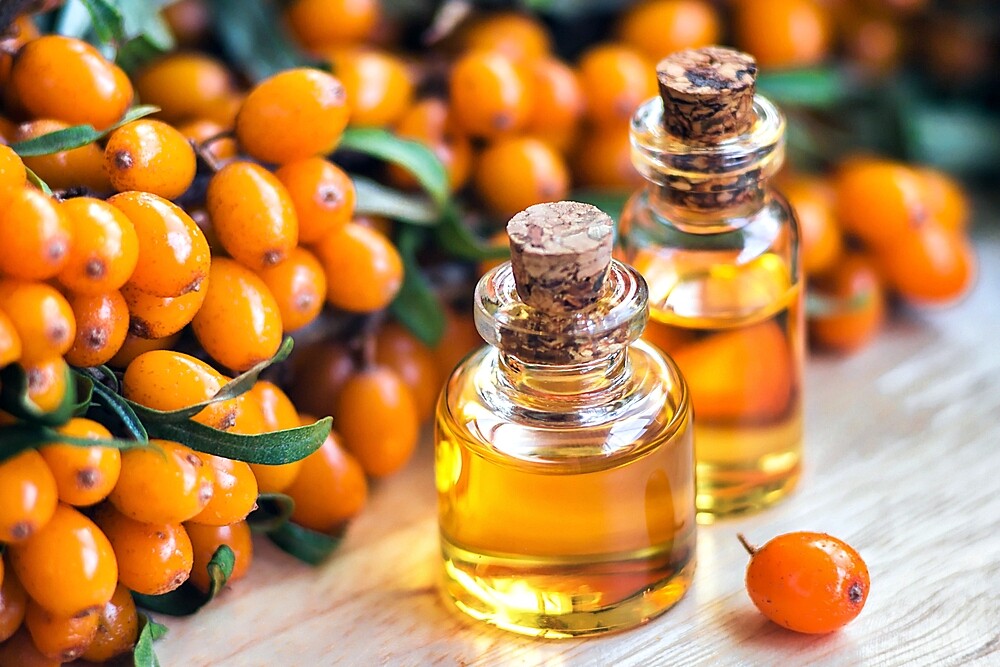Sea buckthorn oil contains many healthy active ingredients and is a real all-purpose weapon for the kitchen and skin. You can find out everything about sea buckthorn oil here.
Sea buckthorn oil: Background
- Sea buckthorn oil is still quite unknown. Yet the oil from the orange-yellow fruits is as healthy as it is aromatic. But when we talk about sea buckthorn oil, we actually have to speak in the plural. Because there are two different types of oil that are extracted from the sea buckthorn berries.
- First there is the kernel oil, extracted from the sea buckthorn seeds. It is light yellowish and develops a relatively neutral taste. Therefore it plays a subordinate role in nutrition and is used more in the beauty and health sector.
- Then there is the sea buckthorn oil made from fruit pulp. It differs from the kernel oil by its much darker, almost red appearance. It is also rather thin and very aromatic.
Production of sea buckthorn oil
The production of sea buckthorn oil is similar to that of olive oil. The fruits are harvested and washed. Then the pulp is removed from the pit. From the fruit flesh or core, the high-quality oil is obtained by cold pressing.
Ingredients and nutritional values
Yes, sea buckthorn oil is healthy. But why? Well, it contains many important vitamins and minerals as well as good fatty acids. What effect these have on our health you will find out in the next section.
- Vitamin C
- Vitamin E
- Carotenoids
- Unsaturated fatty acids
- Magnesium
- Manganese
- Calcium
- Iron
Nutritional values (100 ml)
- Calories: 900 kcal
- Carbohydrates: 0 g
- Fat: 99 g
- Protein: 0 g
Sea buckthorn oil: Effect
- Improves skin regeneration
- Strengthens the immune system through high levels of vitamin C (important for colds)
- For vegetarians and vegans the oil is a valuable supplier of vitamin B12
- Anti-inflammatory, inhibiting and caring for the skin
- Analgesic for stomach diseases
- Used as an adjunct to radiotherapy in cancer treatment
Sea buckthorn oil: Application
- Sea buckthorn oil is best used in combination with another vegetable oil. On its own, the oil tastes extremely intense. In addition, you can take in the vitamins and nutrients more completely together with another vegetable oil. Last but not least, there is another advantage of using the oil sparingly: You save money. Because sea buckthorn oil is anything but cheap. A 100 ml bottle can cost 40 euros.
- You can use sea buckthorn oil for refining in the kitchen. For example, it can give salads, curd cheese or vegetables a wonderful aroma. But use it cold and not for cooking. If you have an upset stomach, you should take a teaspoon before each meal.
- You can rub a few drops of the oil on the skin, especially in case of inflammation or for wound healing. Sea buckthorn oil can also be worth a try for skin diseases such as acne or neurodermatitis. Especially if the disease is more severe, however, you should consult your doctor in advance.
Sea buckthorn oil: Storage tips
- Sea buckthorn oil, just like other vegetable oils, has a great advantage in terms of durability: it practically does not go bad. This is due to the fatty acids it contains, which do not allow bacteria to settle down.
- However, make sure you store the oil in a dark and cool place, as the fatty acids can decompose when exposed to the sun. As a result, the oil loses its aroma and gets a rancid taste. Always keep it well closed.
Buy sea buckthorn oil
You’re wondering: Where do I even get sea buckthorn oil? The product has not yet really found its way into the usual supermarkets. Look for health food stores or organic supermarkets, which are now available in every major city. You can also get sea buckthorn online via various shops.
When buying sea buckthorn oil, pay attention to the following characteristics in order to obtain a good quality:
- Organic cultivation with natural berries (fruits)
- Cold pressed
- Not diluted
- Pure

